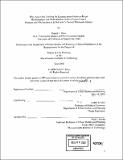Why aren't we looking for lessons about producer-buyer relationships and niche markets in non-export cases? : farmers and wholesalers in El Salvador's central wholesale market
Author(s)
Moss, Daniel J. (Daniel Jay), 1959-
DownloadFull printable version (3.740Mb)
Other Contributors
Massachusetts Institute of Technology. Dept. of Urban Studies and Planning.
Advisor
Judith Tendler.
Terms of use
Metadata
Show full item recordAbstract
Two trends in the development field slow resolving small farmers' difficult entry into marketplaces. The first is that in seeking to enhance small farmer competitiveness, analysts and policy makers tend to look towards production rather than marketing improvements, missing growth linkages to other sectors in which farmers become embedded through their marketing activities. The second is that where marketing is considered, there tends to be a disproportionate focus on non-traditional crops grown for specialty export markets. This paper analyzes how small farmers from the Las Pilas region of El Salvador competed against imports to become potato, cabbage and tomato suppliers to wholesalers in the national wholesale market, the Tiendona. Enduring relationships with buyers in the wholesale market created opportunities and pressures for Las Pilas farmers to market and produce a diversity of crops over the course of 25 years and stimulate linked sectors of their local economy. This type of hands-on, tacit learning about marketing contrasts with 1) supply-driven assistance programs aimed at improving production and; 2) being informed about marketing opportunities by a broker. The analysis suggests that farmer learning through marketing is as important to success in production as learning about production directly. The Tiendona is flooded by Guatemalan and Honduran tomatoes. Long-standing sourcing arrangements between Salvadoran wholesalers and Guatemalan and Honduran growers were altered by small wholesalers' collective actions pressuring the marketplace administration to cede vending space to them. Las Pilas small farmers were then able to enter the marketplace as suppliers to the small wholesalers. The Tiendona's public, contested nature contrasts with export marketing channels where there are few public pressure points to influence marketplace policies and buyers' sourcing decisions. Power asymmetries and coordination problems between producers and buyers can dissuade production. The case examined here finds robust marketing relationships between small wholesalers and small farmers driving crop diversification and production and marketing success.
Description
Thesis (M.C.P.)--Massachusetts Institute of Technology, Dept. of Urban Studies and Planning, 2000. Includes bibliographical references (leaves 59-63).
Date issued
2000Department
Massachusetts Institute of Technology. Department of Urban Studies and PlanningPublisher
Massachusetts Institute of Technology
Keywords
Urban Studies and Planning.